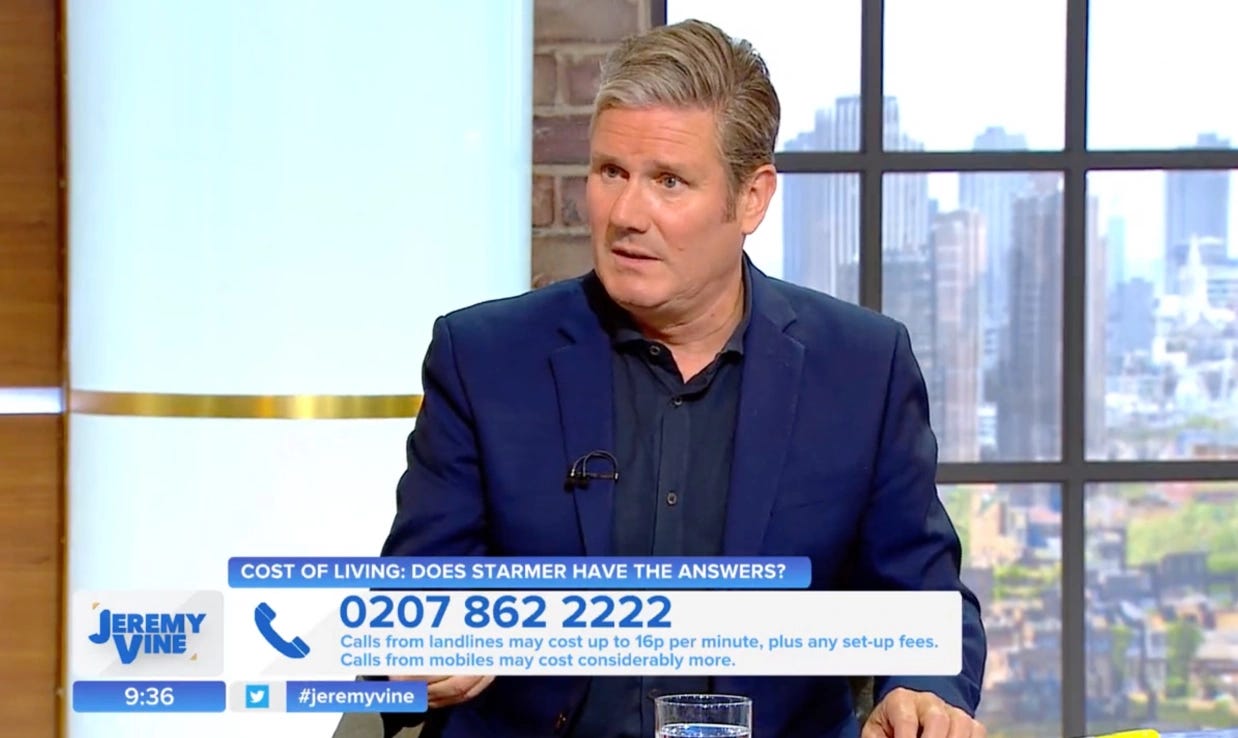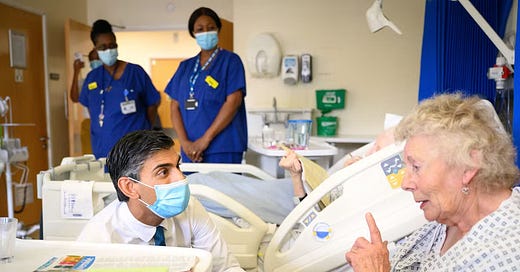Interest rates and pressures
Yesterday, the Bank of England’s Monetary Policy Committee voted to set interest rates at 3%, the biggest single increase (0.75) since 1989.
In its statement, the MPC said:
“GDP is expected to decline by around ¾% during 2022 H2, in part reflecting the squeeze on real incomes from higher global energy and tradable goods prices… GDP is projected to continue to fall throughout 2023 and 2024 H1, as high energy prices and materially tighter financial conditions weigh on spending.”
In other words, we are already in a recession that is expected to last until mid-2024 (coincidentally, perhaps, the time of the next scheduled election).
The Bank is primarily concerned about factors driving inflation, including demand. While the energy price guarantee caps energy prices and thus slows inflation, the Bank worries that “the support could augment inflationary pressures in non-energy goods and services” — i.e., you’ll have more money (relatively) to spend on food, clothing and other essentials.
Although the Bank expects unemployment to almost double by 2024 (from 3.5% to 6.5%), they note that the labour market remains tight. This concerns them because if people keep earning, they keep spending; or, as the Bank puts it, “continuing signs of firmer inflation in domestic prices and wages”.
The Bank notes that “if the outlook suggests more persistent inflationary pressures,” say, higher wages, “it will respond forcefully”, i.e. to counteract that by raising interest rates further and faster.
Real terms public sector pay cut
So what kind of pressure does this put on the Government, which is seeking to stay on the Bank’s good side after recent events, when it comes to decisions over public sector pay?
No doubt the Bank would consider any attempt to raise public sector pay to be dangerously inflationary.
With over 1 million public sector workers currently being balloted over potential strike action, following major strike action from rail and postal workers over the summer, Rishi Sunak will find it hard to please the Bank of England while avoiding a politically damaging fight with public sector unions.
The issue was highlighted in one of Sunak’s first public appearances as PM last week, when an elderly patient in a Croydon hospital confronted Sunak over failing to pay nurses properly.
All eyes are on the 17 November fiscal statement, with the Times reporting on Monday that the public sector pay rise would be 2%:
“Such a pay rise would represent real-term cuts for nurses, teachers, police officers and soldiers. Inflation is forecast to remain at up to 9.5 per cent for much of next year. It would also be lower than the average public sector pay rise this year, which was about 5 per cent and led to threats of industrial action.”
There was widespread condemnation of this plan from teachers’ and nurses’ unions. Key public sector unions are backing the TUC,
“to organise coordinated action over pay and terms and conditions, including further demonstrations, national and regional rallies, and coordinated industrial action where possible.”
Labour backbenchers call for wealth tax to fund pay rise
On Tuesday, Labour MP Beth Winter led a debate in Westminster Hall on “Public sector pay: proposed strike action”.
Sitting in the public gallery were workers from Barnet Homes (owned and managed by Barnet Council), organised by Unison, who are on strike after Barnet Homes refused to pay an injured worker sick pay. There was a 100% turnout and 100% voted to strike. Several MPs declared their support for the workers in the gallery.

However, only Labour and SNP MPs attended the debate, with the responding Minister the lone Tory.
Winter spoke about the legacy of public sector pay freezes going back to the austerity years of the early 2010s and the impact of the cost-of-living crisis on public sector workers, despite having been championed as “key workers” during the pandemic, and called on the Government,
“to fund a fair, inflation-proofed pay rise through a fairer taxation system.”
Winter and several other MPs raised a point made by Kevin Courtney, the joint general secretary of the National Education Union, and Pat Cullen, the general secretary of the Royal College of Nursing: a real-terms pay cut will make staff recruitment and retention even more difficult for essential services where staffing issues are already causing major issues.
Winter recognised that the cost of “offering an inflation-matching pay award to all public sector employees” would be around £17.8 billion. She called for a range of wealth taxes to fund this spending, including equalising capital gains with income tax, claiming this would raise £14 billion a year.
Several MPs — both Labour and SNP — attacked the Government’s record on Trade Union rights, including the forthcoming Transport Strikes (Minimum Service Levels) Bill and plans to use agency staff as scabs, which they claimed impinges on the right to strike.
However, it was clear that the Labour MPs present represented a certain wing of the party — the likes of Clive Lewis and John McDonnell. SNP MP David Linden picked at this wound, saying:
“the challenge for the right hon. and learned Member for Holborn and St Pancras (Keir Starmer) is not to play these games with the Government, no to get as close as possible to them and not to go for that middle-ground vote. He should be brave, stand up for workers and not just try to be a pale imitation of the Tories.”

Later, when Linden pressed Labour spokesperson Sarah Jones on whether Starmer would stick to support for workers, she told him to stop making “cheap points”, and enumerated Labour’s plans were they to win power:
“Within the first 100 days of a Labour Government, we will outlaw fire and rehire; ban zero-hours contracts; secure rights at work from day one; reform statutory sick pay; reform and strengthen paternity and maternity rights; oversee the roll-out of fair pay agreements to drive up pay and conditions for workers; and introduce an economic policy that will deliver high skilled, well-paid jobs, such as those with Great British energy, which will be a publicly owned energy company to invest in clean UK power.”
However, as the statements from the Bank of England yesterday made clear, there will be great pressure for Labour — presenting itself as the party of fiscal responsibility — to back away from measures that could “suggest more persistent inflationary pressures”, were they to come to power.
And if there are big public sector strikes in the coming months, Starmer will be under pressure: on the one hand, to keep his backbenchers happy and use the external energy to push for a general election and weaken the government by supporting the strikes; on the other hand, to not appear too radical, not spook “middle England” voters and not make promises that he can’t later keep.
We saw how difficult that was for him during strikes over the summer.
For Rishi Sunak, the honeymoon is soon to come to an end, as the “difficult decisions” and austerity 2.0 are laid before the public. There is of course scope to give just enough to prevent the worst of a clash with the unions or to try to pit “militant” public sector unions, against public opinion and private sector workers. How he navigates the politics of public sector pay will be a major test of his premiership.





